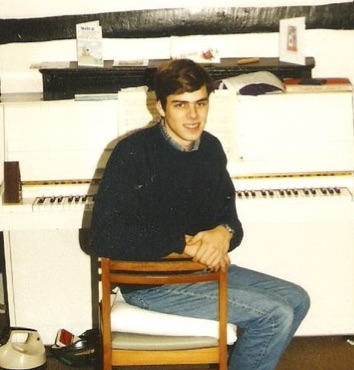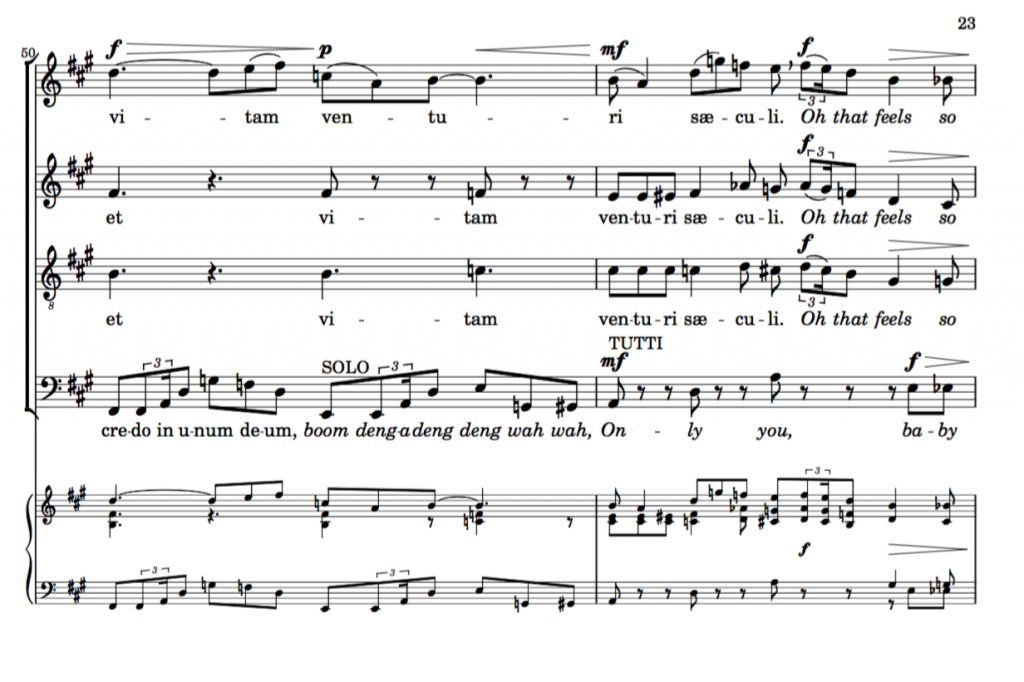In this month’s blog post, Richard Jones gives a disarming and provocative account of his departure and return to music studies and composition. Richard is currently a research student in musical composition at the University of Bristol under John Pickard and Michael Ellison. You can hear some of Richard’s music at www.rtjonesmusic.uk.
Seventeen years after graduating in Music from King’s College, Cambridge, I once again enrolled as a post-graduate music student in 2017. Back in 2000, I had categorically ruled out any further musical endeavours in a ‘professional’ environment, having struggled to adjust to the university’s modus operandi. By the end of my third year, I had become sickened by the idea of being a musician of any description and wanted nothing more than to run away. I know that my undergraduate experience is far from unique, so I hope that a personal account of my time(s) at university may provide some honest and cathartic encouragement to those who perhaps floundered as undergraduates yet – at the back of their minds – may still be toying with the idea of pursuing a masters or PhD degree. (Spoiler alert: Do it!)

At nineteen, I suppose I was utterly ignorant of what life at a British elite university might be like. Having lived in provincial Germany prior to becoming a student, I had been under the near-exclusive musical tutelage of a Germanic eccentric equipped with exceptional pianistic skill and an invidiously technical PhD in Schenkerian analysis. His zealous, conflicted, rudely unaccountable preferences (he refused to teach me composition, favouring unappetizing Schenker graphs so long and detailed they extended over several taped-together pieces of A3 paper) were a far cry from the broad, balanced and institutionally homogenised musical education most of my Cambridge peers had received – I hadn’t done a single ABRSM grade (there is no German equivalent), and was entirely self-taught in many areas, including composition. My education up to that point had been patchy, unorthodox, solitary (I had known no-one my age who had shared my musical interests) and in another language. Getting up to institutional lightspeed took me well over a year.
And yet I was – and still am – besotted by the Academy’s promise: to provide guidance and instruction from wizened masters of the arts, and to set the stage for eager thinkers to exchange their ideas, influence one another, and change together. Part of the appeal certainly lay in the quarantined, idyllic surroundings: the out-of-touch ‘ivory tower’, a safe, nurturing refuge for all us ‘weirdos’. As an ignorant Romantic yearning for a safe haven, I didn’t appreciate back then that the education system in general, and elite universities in particular, tend to be exclusionist rather than exclusive in order to maintain the social order. But I did learn a lot and was forced to engage with musical material and history in ways that I hadn’t considered, cutting through established habits and prejudices in the process. And I made wonderful friends, especially, but not exclusively, with other misfits. From my second year onwards, I even – finally! – had lessons in free composition.
Like most student composers, I felt immense pressure to write music that was intellectually and technically impressive – and of course I was eager to please the authority figures who would be marking my stuff and achieve ‘success’. It turned out that my anxieties were more widely shared than I initially thought. In my final year, I attended an informal colloquium at my composition teacher’s house to which all student composers had been invited, and which was attended by all three resident composers. I will recount the event in some detail because I find it emblematic of university life at its best: people thrown together in a room, talking shop, with unexpected outcomes.
The theme – if indeed there was one – was something really bland and open-ended like ‘Being a Composer Today’ or ‘The Future of British Music’ – I can’t remember. What I do remember is one of the more illustrious first-year students, who’d already managed to get an orchestral piece of his played on Radio 3, bathed in institutional approval, raise a hand and lament the fact that he couldn’t “wear his heart on his sleeve” when composing – in fear of the result lacking artistic or intellectual clout. It instantly polarised the room into those who sympathised and those who mocked the sentiment and climaxed in one of the senior composers admitting to not being able to write the kind of music he wanted to either. He cited banal logistics as fatally confining: demanding ensembles and venues, restricted rehearsal time, traditional concert durations and the like – he hopelessly dreamed of writing “three-hour oases of sound”. And while one of his colleagues was eager to shoot him down, I was astonished by the display of candour, the fleeting hiatus in macho bravura (it’s feasible that there weren’t any women in the room at all)– some sort of cat was truly out of the bag, if only for a moment. It was so pathetic, and so good. (Years later, I would happen to be talking to the head of music at a school where this same “heart-on-sleeve” composer had been working; he had apparently retired from composition on the grounds of being fed up with writing music he wouldn’t want to listen to. Good for him.) I left the room mid-debate, feeling confused and alienated by both sides of the argument.
I turned my back on composing art music, and didn’t return to it properly until 2012, thanks in large part to the explicit support of my then wife. But working in a vacuum proved tiresome. It was like being a teenager again – no-one to talk to, no-one to share ideas with. The musician friends I’d retained from university had grown so jaded by musical enterprise that I didn’t want to test their patience. Also, my ideas were fragile, and I was afraid they would be dismissed before they’d had a chance to germinate and grow to a decent size. It was a lonely, quixotic time. Finally, after years of self-imposed solitary confinement, I was prepared to give the Academy’s promise another chance. I was older, more self-assured as a creative musician, and had family, work and friends outside of university – it could never be an all-governing, all-consuming environment again.
And so, I contacted a promising-looking potential supervisor in my area for an interview. Within the first few minutes of speaking to him, I experienced a sugar rush of kindredness: how nice to be talking to someone ‘proper’ about what I’d been doing these last five years! When he mentioned that I’d be expected to be part of a “scholarly community”, I was sold. Weekly postgraduate seminars with guest speakers from all over the world? Followed by drinks down the pub? The mind boggled. Regular supervisions, and opportunities to have my pieces workshopped by professional ensembles? Why hadn’t I gone for this sooner?
I knew of course what I was signing up for this time around. I’d probably have to brace myself once again against intellectual peacocks strutting their well-rehearsed, shallow act. There’d be the institutional absurdity of ‘classical music’ to contend with. There would be shameless careerists and charlatans. I’d still feel like a duck out of water, not really knowing what I was doing. But I’ve also met like-minded, genuine, charming and cultured musicians with whom to be silly and serious, challenge and be challenged, listen and learn. And the luxury of choosing my supervisor (I enrolled on the PhD programme as an MPhil student rather than a taught MA) means I’m getting the sort of expertise and attitude that I want. I’ve been encouraged to branch out and ended up writing for choir and string quartet in my first year, two ensembles I’d previously disregarded as too connotatively one-dimensional.
One of the resulting works, a “Mass of the Ordinary” for SATB choir, proved to be a significant step forward in my polystylistic ambitions. In it, the sacred “Mass” (the worship of God and the eternal) collides with the profane and “ordinary” (the worship of a certain strain of sex, of instant gratification and of commodity); the ‘high’, timeless musical practices of sacred music (learned harmony and counterpoint) join hands with the ‘low’ and fashionable (repetitive musical kitsch); and popular/populist words and music from various points in recent history operate alongside the rarefied words of the ancient Latin Mass. With a bit of luck, this postmodern dissolution of boundaries might generate a truthful panorama regarding ecclesiastical and corporate propaganda about humanity’s most powerful emotion – love. The Credo, written in a doo-wop style, was recorded by the BBC Singers alongside two other postgraduate pieces: an altogether giddy, jaw-dropping experience.

Halfway through my second year, there was an uncannily familiar incident. I volunteered to lead a workshop with a fellow PhD composer for third-year undergraduate and MA composers who were in the early stages of preparing their composition portfolios, to be submitted to, and scrutinised by, the institution. After discussing different practical approaches (does one have a structural blueprint or not? Is it better to compose in front of Sibelius, with pen and paper, at an instrument or out in the countryside?), one student admitted that she felt she couldn’t write the music she wanted to for fear of it lacking intellectual credentials, and consequently not achieving the high mark she obviously wanted. Other students chimed in with similar sentiments. I later put this to some of the composition teachers, who were disappointed and even dismayed. One gentlemanly composer insisted that the department didn’t enforce any house style, and positively encouraged students to develop their own musical language. And I know it’s true. Yet universities appear to inherently carry this ghostly, toxic pressure in their fabric, even when individuals in positions of authority do their best not to. How can a composition professor’s passionately held views not intimidate a much younger, more vulnerable student, especially when they sense that said professor is politely biting her tongue whenever she peruses the student’s music? This doesn’t take away from the wonders of university life, but is something about which to be constantly vigilant. Of course, the instinct to conform, and to transform oneself into a more appealing and successful member of society, doesn’t just come to the fore in a university environment. It’s just that this sort of compliance is essentially at odds with the very principles that academia purports to champion: uncompromised thought and investigative curiosity.
You can see that my misgivings about institutions linger. But I can honestly say that I’m thoroughly enjoying myself at university. The opportunity to once again engage on a regular basis with an array of competent and keen musicians has been a real pleasure. I am all too aware that doing a PhD can be an incredibly lonely business, yet universities offer a plethora of social opportunities, and it is worth exploring them. My advice to any research student would be: go to the seminars, join a society or ensemble, engage with as many people as you can – your work and your spirit will benefit. And if you have the energy and inclination, why not customise a piece of ivory tower: a handful of PhD students, myself included, are currently in the process of setting up a regular listening and reading group in the music department. I can’t wait for the first session – people thrown together in a room, talking shop, with unexpected outcomes. You’re welcome to join us.
